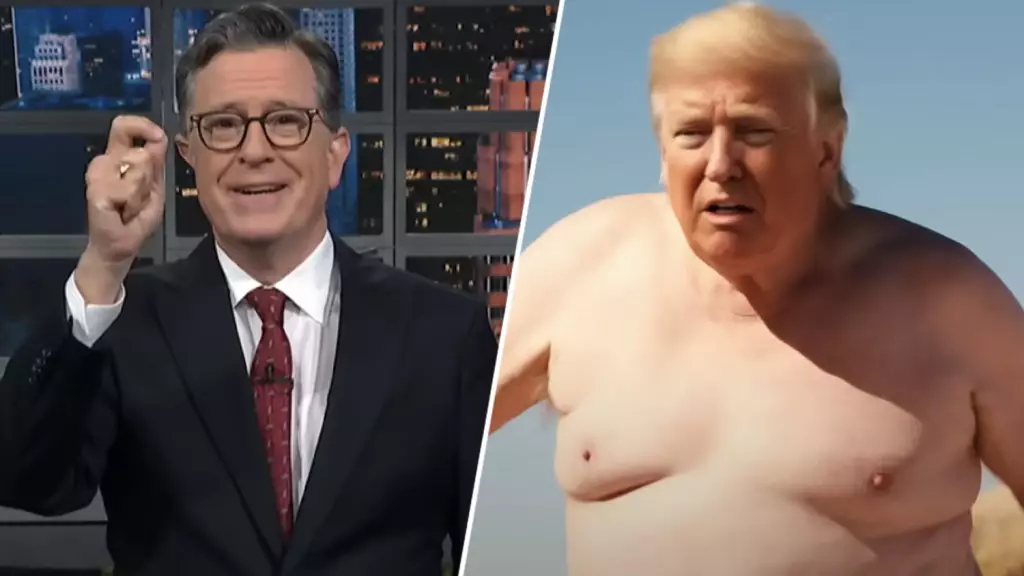In an era where politics and entertainment are inextricably intertwined, satire emerges as one of the most potent tools for challenging authority and shaping public opinion. Shows like South Park and personalities such as Stephen Colbert utilize humor not merely to entertain but to question the very fabric of political power. Their ability to craft provocative content—whether through exaggerated imagery, offensive caricatures, or biting commentary—serves as an act of defiance that forces audiences to confront uncomfortable truths. This form of satire doesn’t shy away from controversy; it amplifies it, emphasizing that societal change often begins with challenging the status quo in ways that traditional discourse can’t achieve.
The recent South Park season premiere exemplifies this strategy, boldly depicting Trump in a nude deepfake in a manner that some could see as crude, yet is arguably a reflection of the chaotic persona often associated with the former president. Such imagery acts as a mirror, forcing viewers to question the boundaries of decency and decency in political discourse, while simultaneously exposing the absurdities of celebrity culture intertwined with political power. When comedians and satirists draw attention to these issues through shock value, it sparks conversations that might otherwise remain buried under layers of politeness or censorship.
The Role of Media Intervention in Political Narratives
Media outlets, especially late-night shows, have long wielded influence in shaping narratives around political figures. Stephen Colbert’s recent monologue, ironically aired before the unceremonious cancellation of his show, illustrates the shifting landscape of influence and control. His pointed joke about AI and censorship—highlighting the potential for government regulation to stifle creative expression—underscores an important paradox. In a time when AI-generated content like deepfakes can be used to manipulate images and narratives, regulatory measures threaten to be both a safeguard and a censorship tool.
Colbert’s playful endorsement of South Park’s controversial content underscores a broader message: in the battle over free speech versus societal censorship, satire remains a critical battleground. His inclusion of a QR code linking to the scene serves as a digital rebellion, reinforcing that truth and dissent have found new channels of dissemination outside traditional platforms. The media’s role, therefore, is not just to inform but to challenge authority and champion the unfiltered exchange of ideas—even when those ideas are offensive or provocative.
The Complexity of Cultural Reflection and Political Critique
The episode’s narrative cleverly intertwines satire with a critique of contemporary politics. The depiction of Trump in a comically exaggerated PSA about his manhood, his accusations of media suppression, and his aggressive actions—such as attempting to seduce Satan—are all hyperbolic reflections of his controversial political persona. The creativity behind these portrayals isn’t just for shock; it serves to underscore the absurdity and often surreal nature of modern political drama.
Furthermore, the conflict between South Park’s creators and Paramount highlights the tension between artistic freedom and corporate interests. While Parker and Stone have signed new deals with Paramount, their satirical content—especially when it critiques powerful figures—continues to stir controversy. The scrutiny faced by both the show and the network reveals a deeper societal debate about where the line should be drawn between free expression and corporate censorship. It begs the question: is the suppression of provocative satire a sign of a healthier democracy or an ominous trend towards control?
The Power Dynamics of Celebrity and Political Influence
President Trump’s reactions—celebrating Colbert’s cancellation and mocking the media—demonstrate how deeply intertwined celebrity and political spheres have become. His ability to influence public discourse, whether through social media or political posturing, underscores a disturbing trend: when figures with significant power dismiss or mock satire, it reflects a broader erosion of respect for institutional checks and balances.
Meanwhile, the corporate landscape mirrors these tensions. Paramount’s settlement with Trump and subsequent cancellations hint at a complicated dance of influence, where political and business interests often blur. These power plays reveal a fragile ecosystem where creative expression and political commentary are increasingly pawns in larger strategic games. Yet, the resilience of satire suggests a persistent refusal to be silenced—a reminder that humor remains a vital form of resistance, especially for those who feel marginalized or targeted by oppressive narratives.
In today’s turbulent political climate, satire is not just entertainment; it’s an act of resistance, a challenge to authoritarian tendencies, and a reflection of societal truths. Despite attempts at censorship, corporate pressures, and the ever-present threat of political retaliation, the power of humor to catalyze change remains undiminished. The clashes and controversies we witness are proof that the battleground of free speech is alive and well—largely fueled by individuals willing to push boundaries and question authority. The ongoing dialogue between popular culture and politics underscores an essential truth: in times of chaos, honest and fearless satire provides the clarity and courage necessary for a healthier, more aware society.
